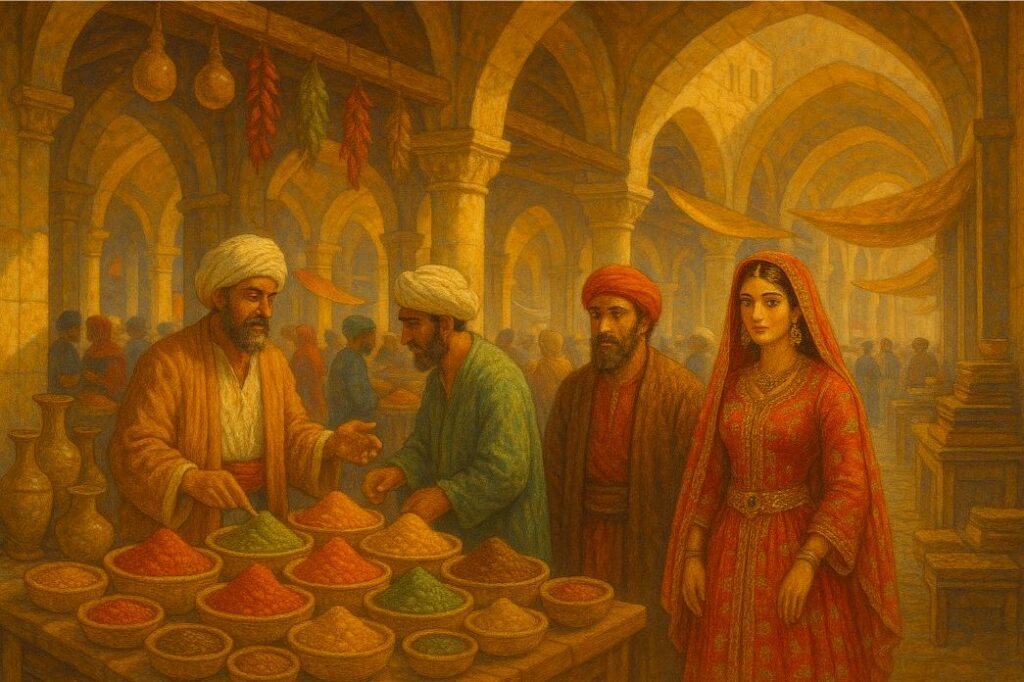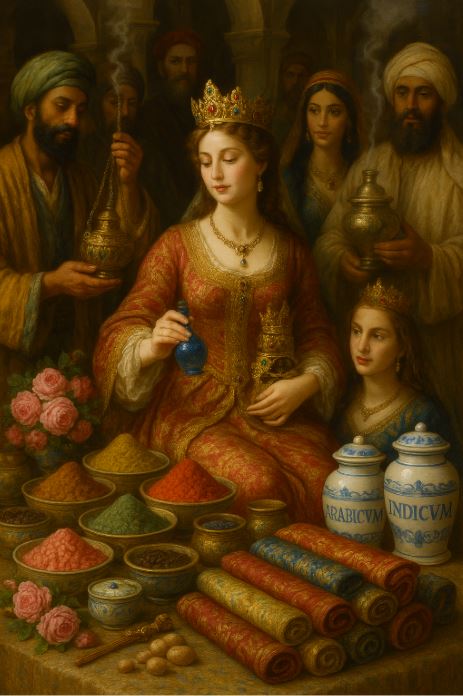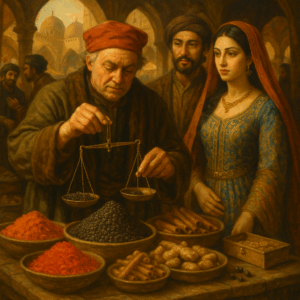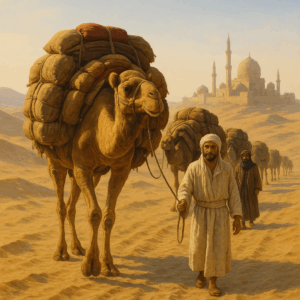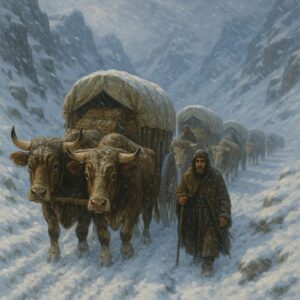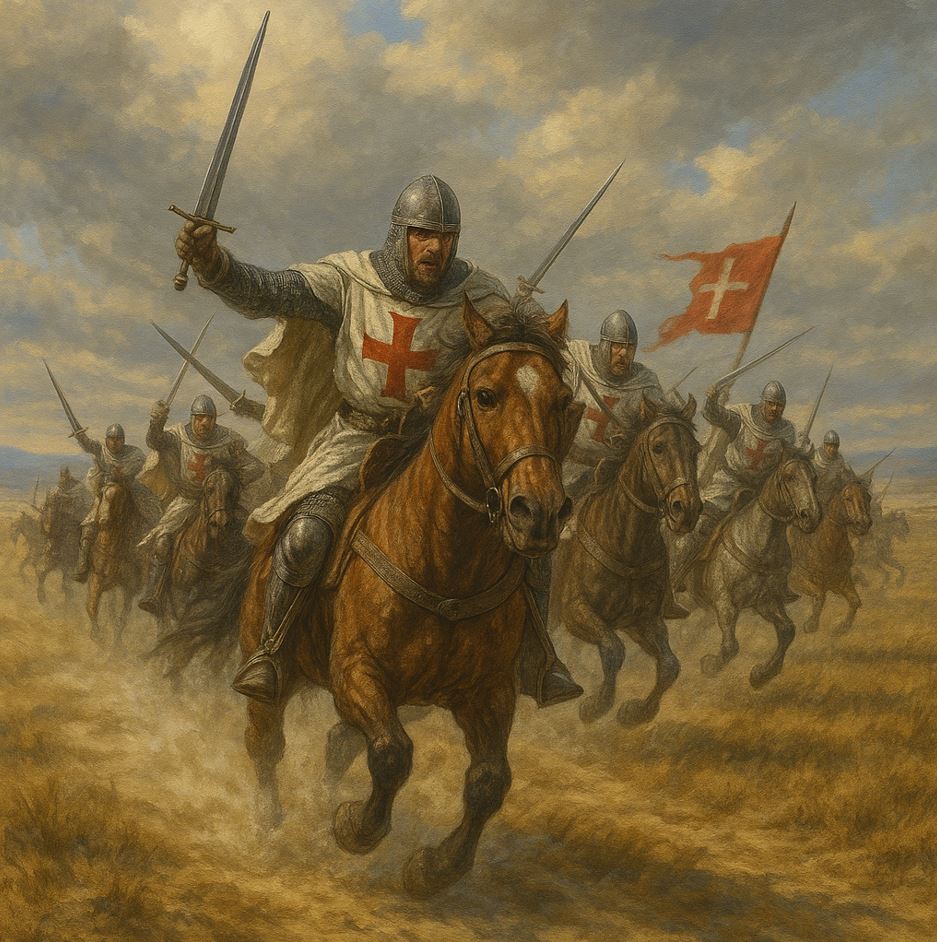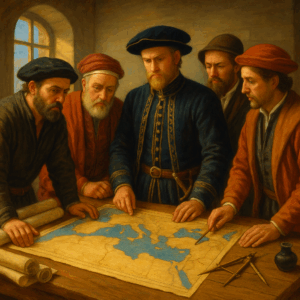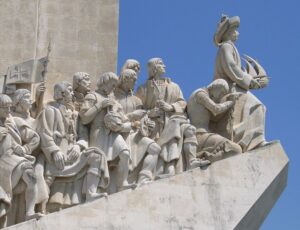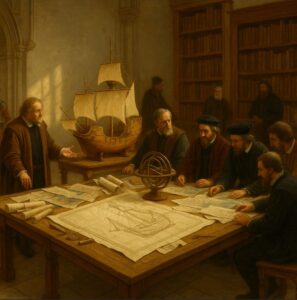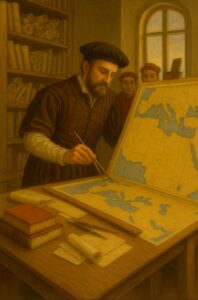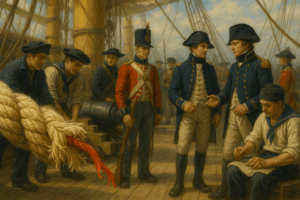[source: “Conqueror of the Seas – The Story of Magellan”, Chapter. 1 – Stefan Zweig]
The quest for spices began it. From the days when the Romans, in their journeys and their wars, first acquired a taste for the hot or aromatic, the pungent or intoxicating dietetic adjuvants of the East, the Western World found it impossible to get on without a supply of Indian spices in cellar and storeroom. Lacking spices, the food of Northern Europe was unspeakably monotonous and insipid, and thus it remained far into the Middle Ages. Centuries were to elapse before the fruits, the tubers, and the other products which now seem commonplaces were to be used or acclimatized in Europe. Potatoes, tomatoes, and com were unknown. There were no lemons to prepare acid drinks, there was no sugar for sweetening, the cheering tea and coffee were still lacking; even at the tables of the rich and the powerful, there was naught to relieve the sameness of perpetual gluttony— until, wonderful to relate, it was found that a touch of spice from the Orient, a dash of pepper, a minute addition of ground nutmeg, the mingling of a little ginger or cinnamon with the coarsest of dishes, would give an unwonted and wholesome stimulus to the jaded palate. Precious culinary overtones were interspersed between the crude treble and bass of sour and sweet, of sapid and vapid; and the still barbaric medieval gustatory nerves speedily found it impossible to dispense with these exotic flavourings. More and more of them was demanded. A dish was not properly prepared unless it had been pricked up with so gross an excess of pepper that it bit the eater’s tongue immoderately. Even beer was strongly seasoned with ginger, and mulled wine was so laden with spices that it tasted like liquid fire.
The West, however, needed spices and kindred Oriental products not for the kitchen alone. The women of Europe made an increasing demand for the sweet-scented products of Arabia: wanton musk, fragrant ambergris, heavy-smelling attar of roses. They asked weavers and dyers to provide them with Chinese silks and Indian damasks, goldsmiths and jewellers to supply them with lustrous pearls from Ceylon and glittering diamonds from Hindustan. Paradoxically enough, the spread of the Catholic faith promoted the use of Oriental products, for not one of the myriad censers swung in the countless churches of Europe drew its supply from European soil, each of them being provided with the materials for its fragrant smoke by sea or by land from the Arabian Peninsula. No less did the apothecaries have to vaunt Indian or Levantine specifics, such as opium, camphor, and the costly gum resin, experience having taught them that their customers would not believe any balsam or other drug to be truly efficacious unless upon the porcelain vessel which contained it there was to be read in blue letters the magic word “Arabian” or “Indian.” The rarity, the exotic character, and doubtless the high price of any Oriental medicament sufficed to enhance its suggestive working in the West. Throughout the Middle Ages, the terms Arabian, Persian, and Indian were, to European ears, almost synonymous with select, exquisite distinguished, precious, and expensive— much as was the attribute “French” during the eighteenth century, elsewhere than in France. No other article of commerce was so much coveted as were Oriental spices, until it seemed that the mysteriously foreign aroma of these products of the distant East must have intoxicated the European mind.
For the very reason that they were so fashionable, Indian goods were dear, and grew steadily dearer. It is difficult, nowadays, to calculate the febrile rise in their prices, for, as is well known, historical accounts of such matters are vague and fabulous. Perhaps the best idea of the crazy cost of spices can be formed by recalling that in the eleventh century of our era pepper, which today stands unguarded on every restaurant table and is scattered almost as freely as sand, was counted out com by com, and was certainly worth its weight in silver. A “pepper-corn rent” is now a nominal rent, but this was not always so. Many States and towns kept their accounts in pepper as if it had been silver or gold. With pepper you could buy land, pay dowries, purchase the freedom of the city. Many princes assessed their taxes in weights of pepper. When, in the Middle Ages, you wished to describe a man as a bloated Croesus, you spoke of him as a “peppersack.” Nor was pepper the only product of this sort. Ginger and cinnamon and camphor were weighed upon apothecaries’ scales, the windows being carefully closed during the operation lest a draught should blow away the minutest fragment of the costly dust.
But however absurd this over-valuation of spices may seem to a modern mind, it becomes comprehensible enough when we recall the difficulties and the risks of transport. In those days the East lay at an immeasurable distance from the West. The trade routes by land were perpetually threatened by robbers, and pirates abounded at sea. Great were the difficulties of travel, immense the risks to which caravans and ships were exposed. What an Odyssey every peppercorn, every dried blossom, had to traverse from the green plant in the Malay Archipelago to reach its last strand on the counter of a European shopkeeper. In the place of origin, not one of these spices was a rarity. On the other side of the earth, the cinnamon-laurel grew in Ceylon, the clove in Amboina, the nutmeg in Banda, the pepper plant in Malabar— as lavishly there as do thistles in our own land. In Malaysia, a hundredweight of one of these products was worth no more than a teaspoonful here in the West. But trade goods passed from hand to hand; the owner of each pair of hands demanded his recompense; and the goods we are now considering had to pass through many hands before they reached those of the last purchaser, the consumer, across deserts and seas.
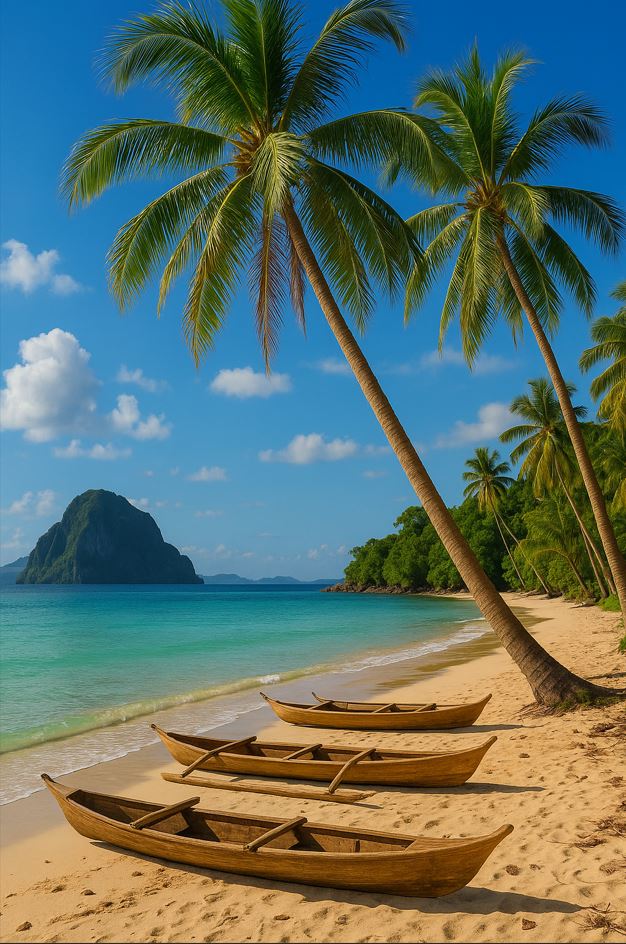
The first hand in the series was, as a rule, the most poorly recompensed— that of the Malayan slave who plucked the fresh blossoms, carrying them to market upon his brown-skinned back and receiving little more than his own sweat for his reward. It was his master who reaped the profit, the master from whom a Mohammedan merchant bought the load, paddling it in his lightly built prahu beneath the tropical sun from the Spice Islands to Malacca, not far from the modern Singapore. Here sat the first of the blood-sucking spiders, the lord of the harbour, the Sultan, demanding tribute from every dealer who wanted to tranship his goods. Not until the dues had been paid, could the aromatic freight be transferred to another and larger bottom in which, by sail or oar, it would be removed a farther stage on its journey, to one of the seaports of Hindustan. Months would be spent in such successive transhipments, for, in these latitudes, the sailing-boats were often becalmed week after week beneath cloudless skies, or must run before fierce hurricanes and escape from sea-robbers by headlong flight. Not only toilsome but fearfully dangerous was the voyage across two or three tropical seas, where, as a rule, at least one out of five ships was sunk by storm or plundered by pirates. With good luck, however, the Gulf of Cambay would at length be crossed, the southern coast of Arabia rounded, and Aden reached (if the destination should be the Red Sea and Egypt); or (if an earlier landfall were sought) Ormuz at the entrance to the Persian Gulf.
But the phase of land-travel that now followed was no less arduous and no less perilous. By thousands, in these seaports, waited the camels in long rows. Obediently, at a sign from the master, they kneeled for the bales of pepper or nutmeg or what not to be laden on their patient backs. Now the four-legged “ships of the desert” continued the north-westward trail. By the more easterly caravan route, which was the commoner, in journeys that lasted for months, the Arab caravans conveyed the Indian goods by way of Basra, Baghdad, and Damascus to Beirut or Trebizond; or, by the western route, to Jidda and Cairo. Extremely ancient are these paths across the desert, well known to caravan leaders since the times of the Pharaohs and the Bactrians. But if known to the itinerant traders, they were known equally well to the Bedouins, the pirates of the desert. One bold raid would often carry off the fruit of laborious months. Besides, what escaped the sandstorms and the Bedouins could not escape other robbers who regarded themselves as legitimate. The emirs of El Hejaz, the sultans of Egypt, and the rulers of Syria demanded tribute (and no small one) on every sack that passed through their territories, Egypt alone, it has been estimated, secured an annual revenue of hundreds of thousands of ducats from the transit trade in spices.
Suppose that Alexandria had been safely reached, here there would be fresh octopuses awaiting their chance, who would prove neither the last nor the least— the ships of the Venetian fleet. Since its perfidious overthrow of its Byzantine rival, the maritime republic had secured a monopoly of the spice trade across the Mediterranean. The goods, instead of being shipped direct to their destination, had now to be brought to the Rialto, where the German, the Flemish, and the British factors would compete with one another for the wares. Then, in broad-wheeled wagons, through the snow and ice of the Alpine passes, would roll onward the precious goods which had come into existence in the tropics at least two years before. At last, at last, they would reach the Western retailers, who, having exacted a fresh profit, would pass them on to the consumer. We learn from Martin Behaim’s famous Nuremberg globe, constructed by that celebrated navigator and cosmographer when, in 1492, he was revisiting the city of his birth, that Indian spices had to pass through at least twelve hands before they reached the consumer. But, though so many had to share in the gains, each succeeded in squeezing a sufficiency of golden sap out of the India trade. Despite all its perils and hardships, the traffic in spices remained by far the most lucrative of the Middle Ages, because the bulk of the commodity was so small and the margin of profit so large. Even though, out of five vessels, four should go to the bottom, carrying their stored riches into the depths (in the case of Magellan’s expedition, only one ship circumnavigated the world), and even though of two hundred and sixty-five men who set sail, more than two hundred should never get home, still it was only sailors and captains who lost their lives, while the trader would harvest his gains just the same. Did but one petty ship out of five reach home, after three years, well freighted with spices, its cargo would bring in a handsome profit. In the fifteenth century, a sack of pepper was worth more than a human life; and since, in those times, as always, there was an ample supply of lives, since lives were cheap and spices were dear, we need not be surprised that the merchants usually made good; that the palaces of Venice and those of the Fuggers and the Welsers were strongly built out of the rewards of the Indian spice traffic.
But as inevitably as iron rusts, does covetousness fester the souls of profiteers. Every trading advantage, every monopoly, is considered unjust by would-be rivals. The Genoese, the French, and the Spaniards looked askance at the success of the Venetians in diverting the golden Gulf Stream into the Grand Canal. With even more rancour did these trade rivals contemplate Egypt and Syria, where Islam interposed an impenetrable barrier between India and Europe. No Christian ship was allowed to sail the Red Sea, nor was any Christian trader allowed to travel by the land routes to the Indies. The use of Turkish and Arabian intermediaries was inexorably enforced upon the giaours. The upshot of this regulation was not merely a needless increase of cost to European consumers, but also a great withdrawal of profit from Christian merchants. An additional consequence was a steady flow of the precious metals to the Orient, inasmuch as European wares did not move eastward to an extent that could compensate for the exchange value of Indian luxuries. Were it only because of the unfavourable balance of trade, the Western World grew more and more eager to escape from this ruinous and degrading control, until at length forcible measures were taken to bring it to an end. The Crusades were not exclusively or mainly (as romanticists are apt to believe) the outcome of an endeavour to liberate the Holy City from the grip of unbelievers. The primary object of the first military coalition of Christian Europe was to break through the Mohammedan barrier across the Red Sea and thus free the trade routes to the East.
Since the attempt failed, since Egypt could not be tom from the Moslem grasp and Islam continued to bar the way to the Indies, there necessarily arose an urgent desire to discover a new route to Hindustan, which would be delivered from the menace of the followers of the Prophet. The boldness which inspired Columbus’s voyages to the west, Bartholomeus Dias’s and Vasco da Gama’s expeditions to the south, and John Cabot’s voyage from Bristol to Labrador, was, above all, the outcome of the long-repressed yearning to free the West from Mohammedan arrogance and to discover an unhampered route to the Indies on which Christian trade would no longer be shamefully subject to. Islam. Always when important discoveries or inventions are made, those who make them believe that they do so under stress of moral impulsion, whereas often at bottom material motives are at work. No doubt kings and their counsellors would have been impressed by the ideas of Columbus and Magellan, would have been friendly to these explorers’ schemes for ideal reasons. But they would never have opened their pursestrings freely, nor would merchant adventurers have backed the hazards to the extent of equipping fleets, had there not been good prospects of discovering a new trade route to the Indies, the land of gold and spices. Throughout that age of amazing discoveries and explorations, the driving force was the mercantile spirit. Behind the hero stood the trader. Alexander apart, the first impulse to the European invasion of India was thoroughly mundane. The quest for spices began it.
Wonderful things happen in history when the genius of an individual coincides with the genius of the times, when one man perspicaciously grasps the creative yearning of his age. Among the countries of Europe, Portugal, while in prolonged and splendid struggles she had thrown off the Moorish yoke, had not yet found an opportunity of fulfilling her part in Europe’s mission. Though her victory had definitively established her independence, the fine energies of a young and passionate nation lay fallow; the natural will to expansion proper to every rising people had found no outlet. Possibilities of landward extension were restricted by the Spaniards, friends and brothers though these were; so that for a small and poor country the exclusive possibility of enlargement and colonization lay on the sea. At first sight, Portugal’s situation seemed most unfavourable. According to the Ptolemaic system of geography (dominant throughout Europe from the end of the second century until the dose of the Middle Ages), the Atlantic Ocean, whose rollers broke unceasingly on the Portuguese coast, was an endless and non-navigable waste of waters. No less unnavigable, declared Ptolemy in his map of the world, was the southern route along the African coast. It was impossible, taught the Alexandrian geographer whose authority was supreme at all the universities, to live at or near the Equator. Neither animal nor plant could endure the vertical rays of the sun. Uninhabitable sandy deserts extended to the South Pole. There was no possibility of circumnavigation, since Africa continued without a breach into the Terra Australis. In the view of medieval geographers, Portugal, lying beyond the Mediterranean, the only navigable sea, was in the worst possible position among the maritime nations of Europe.
It became the life purpose of a prince of Portugal to prove the possibility of what had been declared impossible, to attempt, in accordance with the words of the Bible, to make the last first. What if Ptolemy, though a leading geographical authority, had been mistaken? What if this Atlantic Ocean, whose nighty waves brought to Portugal’s coast strange ‘woods which must have grown somewhere, was not endless after all, but led to new and unknown lands? What if Africa were habitable south of the Equator? What if the Alexandrian sage had blundered when he declared there could be no seaward route to the south of this unknown continent, that there was no marine means of communication with the Indian Ocean? If Ptolemy had been wrong, Portugal, precisely because situated in the extreme west of Europe, would be the predestined starting-point of all voyages of discovery. Portugal would command the nearest route to the Indies; was not excluded from possibilities of successful navigation, but was privileged in that respect above all the nations of Europe.
This wish-dream, this deter-mination to transform little Portugal into a sea power and to make of the Atlantic Ocean (hitherto regarded as an impassable barrier) a new trade route, became the leading idea of the Infante Enrique, whom history both rightly and unrightly has called Prince Henry the Navigator. Unrightly because, apart from a short voyage on a warship to Ceuta, Henry of Portugal never set foot upon a ship; and no book, no nautical treatise, no map penned by him has come down to us. Yet he is justly styled the Navigator, for he devoted all his wealth to furthering navigation. Having won his spurs in early youth in the Moorish wars during the siege of Ceuta (1415), one of the richest men in the country, son of John I of Portugal (surnamed the Great) and grandson of John of Gaunt, he could have indulged his ambition by aspiring to the most brilliant posts, for he would have been made welcome at any of the courts of Europe, and England offered him high military command. Being, however, an eccentric and an enthusiast, he preferred a life of creative solitude. Establishing his headquarters at Sagres, a small seaport at the south-western extremity of Portugal, near Cape St. Vincent, he erected there an observatory, and directed thence his exploring expeditions. For the rest of his life, which lasted wellnigh half a century more, since he did not die until 1460, he commanded from Sagres the great offensive against the unknown seas.
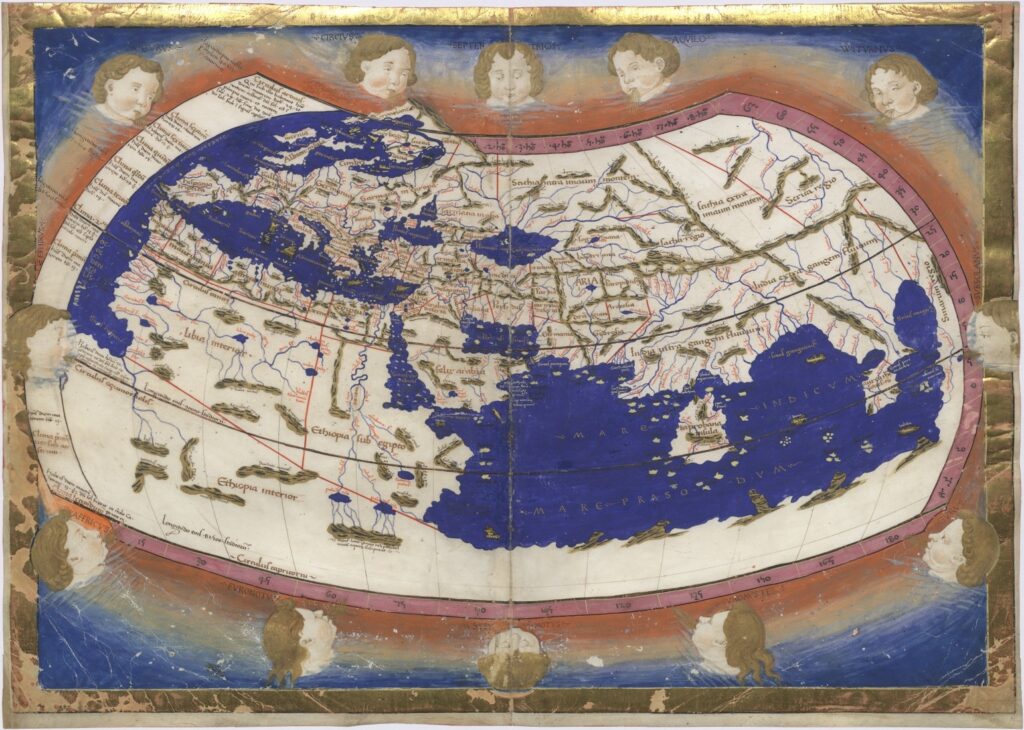
Perhaps we shall never know what gave this bold dreamer the courage to defy the greatest geographical authorities of his time, to disbelieve the contention of Ptolemy and those who accepted Ptolemy’s dictum as incontrovertible, that Africa was a continent extending to the South Pole. Still, we can guess why Prince Henry the Navigator believed it would be possible to sail round Africa into the Indian Ocean. There had always been a rumour, recorded by Herodotus among others, that in the time of the Pharaohs a Phoenician fleet journeyed southward down the Red Sea and, two years later, unexpectedly returned by way of the Pillars of Hercules. It is possible, too, that the Infante had learned from Moorish slave-traders how, beyond Libya Deserta, beyond the sands of the Sahara, was a land of wealth, termed by the Moors “bilat ghana.” There is still extant a map prepared in the year 1150 for Roger II, the Norman king of Sicily, by an Arabian cosmographer in which the region we now call Guinea is correctly inscribed under the designation of “bilat ghana.” (The modern name “guinea,” both the place and the coin, is probably derived from this Moorish word “ghana,” wealth.) Furthermore, it is likely that Prince Henry was better informed than the traditional geographers of his day, who swore by Ptolemy and therefore rejected the writings of Marco Polo and his Arab contemporary Ibn Batuta as “travellers’ tales.” The essential greatness of Prince Henry the Navigator lies in this, that, knowing the vastness of his aims, he knew also the difficulty of attaining them; that he was resigned to the belief it would be impossible for him to see their realization, since the preparation for fulfilment would need more than one generation. How would it be possible to undertake a voyage from Portugal to the Indies without a knowledge of the seas that would have to be traversed, and without ships for the journey?
At the time when Prince Henry set to work, both the geographical and the nautical knowledge of Europe were absurdly primitive. In the Dark Ages which followed the break-up of the West Roman Empire, the cosmography of the Greeks, the Phoenicians, and the Latins had been forgotten. It seemed incredible and to belong to the domain of fable that Alexander had once reached the frontiers of Afghanistan and advanced far into India. Lost were the excellent maps of the Romans; ruined were their military roads, extending into Britain in the North-West and Bithynia in the South-East; vanished was the facility of travel; destroyed was their excellent news-service, which had been geographical as well as political; dead the lust for discovery; pitifully decayed the art of navigation. Lacking bold and distant aims, without compasses or charts, little ships hugged the coast from port to port, in perpetual terror of storms or no less dangerous pirates. Such was the wretched condition of cosmography and so small were the ships, that the conquest of the ocean and of overseas lands seemed out of the question— and this can only enhance the greatness of Prince Henry the Navigator. A generation of labour and sacrifice was requisite to compensate for the neglect of centuries. Prince Henry was determined to devote the whole of his life to the task.
Nothing more than a few ruined walls remains of the castle at Sagres built by Prince Henry and shattered by Sir Francis Drake, the heir of his discoveries. Through the mists of legend it is difficult, at this date, to discern in what fashion Prince Henry elaborated his plans of world conquest for Portugal. According to the accounts of Portuguese chroniclers, which may be in great measure romantic, he collected books and maps from all quarters of the world, summoned Arabian and Jewish sages, and commanded them to prepare better instruments and charts. Every ship’s captain who put into the port was questioned; what information could be gathered was recorded and tabulated; and numerous expeditions were equipped. The art of shipbuilding was greatly improved. Within a few years, the primitive “barcas,” small undecked fishing-smacks to carry eighteen men, had grown into “naos,” broad-beamed cutters with a draught ranging from eighty to one hundred tons, which could keep afloat on the open sea even in bad weather. These new and more seaworthy boats needed a new type of captain. Associated with the captain was a “master of astronomy,” a navigating expert, who could understand the sailing directions, and could make such rough determinations of latitude and longitude as were even possible. Gradually, by theoretical and practical training, those who had been mere fishermen were systematically transformed into navigators and discoverers. Even as King Philipp of Macedon bequeathed to his son Alexander the irresistible phalanx with which Alexander conquered the world, so did Prince Henry the Navigator bequeath to Portugal the best and most modem ships of his time, and the excellent seamen who were to conquer the ocean.
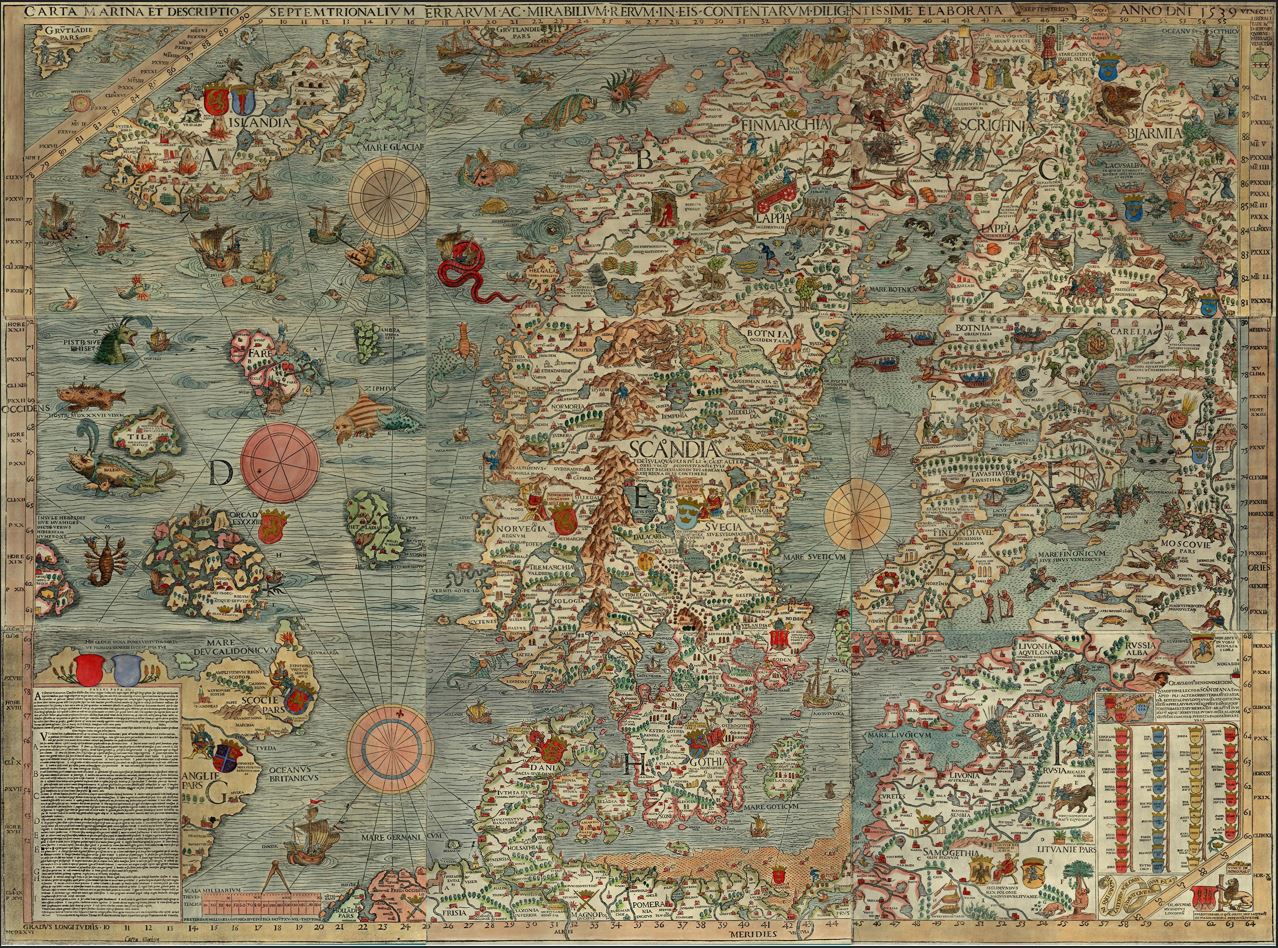
It is, however, a part of the tragic fate of forerunners that they should die without catching more than a distant glimpse of the Promised Land. Prince Henry the Navigator did not survive to see any one of the great discoveries that were to make his country memorable in the history of geographical discovery. When he died at Sagres, on November 13, 1460, scarcely anything of geographical importance had been achieved. The widely trumpeted discovery of the Azores and of Madeira was only a rediscovery, for the existence of the islands was known to Laurentino in 1351. The new “naos” had timidly sailed down the west coast of Africa, but in the course of half a century they had not yet reached the Equator. A petty trade had begun, partly in white ivory and still more in what was called “black ivory”— the latter term meaning that raids were made on the coast of Senegal to carry off Negroes for sale in the Lisbon slave-market. A little gold, too, was brought back from Africa. Such were the inglorious results of Henry’s glorious dreams. Nevertheless, a decisive success had already been achieved. The immense gain to Portuguese navigation lay, not in the distance covered, but in the moral sphere: in the increasing spirit of enterprise, and in the destruction of a paralysing legend. For centuries mariners had whispered one to another that there was a place on the West African coast beyond which it was impossible to sail. On the farther side of this began “Cape Non,” “the green sea of darkness,” and destruction awaited the ship that dared venture into these perilous regions. What would happen there? The boiling waters would melt the pitch and oakum out of the seams; planks and sails would catch fire in the scorching sun; every Christian who tried to enter the “land of Satan,” which was as hot as the crater of a volcano, would be burned as black as a Negro. Thanks to this fable, so overwhelming was the dread of any voyage along the African coast that the Pope, to enable Prince Henry to secure seamen for his first expeditions, had to give every man jack of them a preliminary absolution. Thus only did it become possible to secure a few resolutes for the initial voyages of discovery. What a triumph it was, therefore, when Gil Yanez first rounded the reputedly impassable Cape Non, and came back to report of Guinea that the famous Ptolemy had been proved a humbug, “for it is as easy to sail on this coast as on our own, while the country is extraordinarily rich and beautiful.” The dead point had been passed. Portugal no longer needed to press men into the service, for adventurous spirits flocked from all lands. Every new successful voyage made the mariners bolder. A brood of young and hardy fellows sprang to life, persons who were no longer inclined to count the risks or reckon up the cost. As always when a new generation is inspired with zeal for new work, the world became transformed.
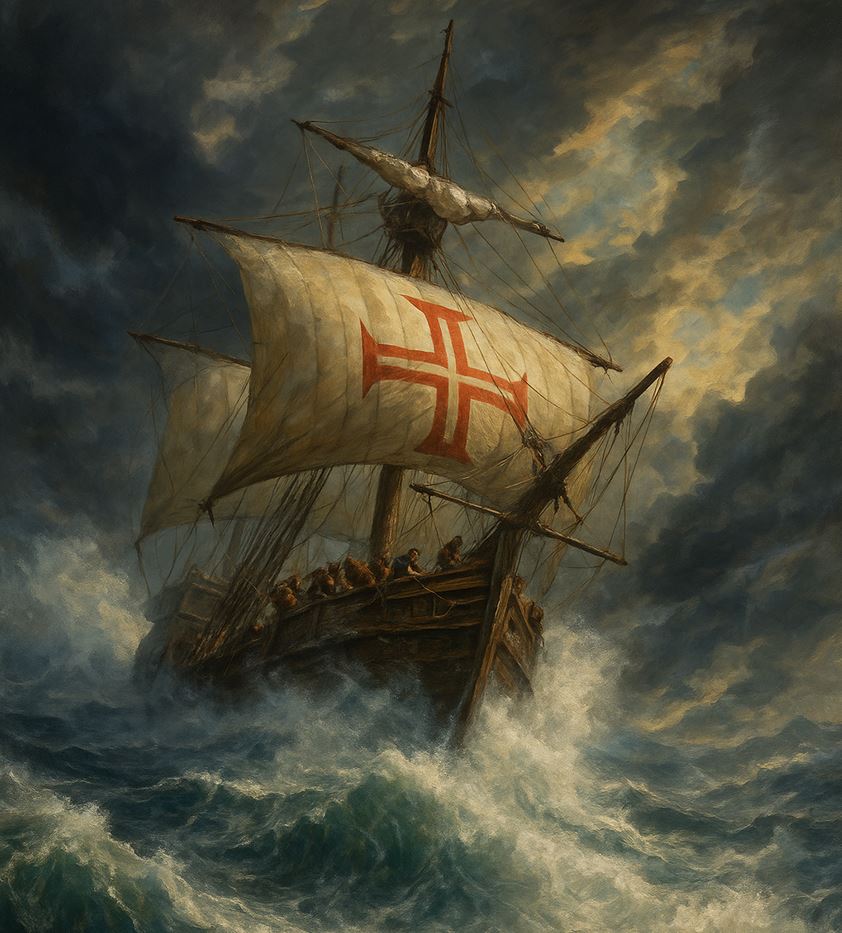
The death of Prince Henry meant no more than a momentary pause, the drawing of a deep breath before the next great leap. Hardly had the energetic King John 11 ascended the throne in the year 1481, when there ensued an impetus exceeding every expectation. What had proceeded at a snail’s pace, now went with the rush of a charging lion. Hitherto, explorers had crept along the coast, but now they advanced with giant strides, exploring as much as a hundred or even five hundred miles a year. Perhaps only our own generation, which is witnessing the conquest of the air, only we, who little more than thirty years ago were willing to rejoice at the tidings of the flight of an aeroplane which was able to sustain itself in the air for five or ten miles beyond its starting point at the Champ-de-Mars; who were wildly exited when, in 1909, Blériot flew across the English Channel, and then, only eighteen years later, were told of the first flight across the Atlantic and of the successful aerial voyage from England to Australia – only we are perhaps in a position to understand the excitement that run through Europe when, towards the close of the fifteenth century, it heard of the triumphs of Portugal. The equator was reached in 1471, Diego Cam landed at the mouth of the Congo in 1484, and finally, in 1486, Enrique’s prophetic dream came true: the Portuguese navigator Bartolomeu Diaz reached the southern tip of Africa, the Cape of Good Hope, which he certainly did for the sake of the storms , whom he meets there, first called Cabo tormentoso, the stormy hillside. But when the weather tears his sails apart and splits his mast, the bold conquistador continues to steer with determination. He has already reached the east coast of Africa, and from here Mohammedan pilots could easily take him to India – the team mutiny: enough has been achieved this time. Bartolomeu Diaz must return, disappointed, losing fame through guilt of others, because he was the first European to conquer the sea route to India, and another Portuguese, Vasco da Gama, will be celebrated in Camoens’ heroic poem for this feat; as always, the beginner, the tragic initiator, remains forgotten about the happier completion. After all: the decisive act is done. For the first time, the geographical shape of Africa has been finally determined, proved for the first time against Ptolemy and proved that the free sea route to India is possible. The disciples and the heirs of Prince Henry the Navigator had fulfilled their master’s wish-dream a generation after their master’s death.
The gaze of the Western World was now directed with astonishment and envy at this small and hitherto unconsidered nation of sailors established upon the south-western corner of Europe. While the great powers— France, Germany, and Italy— were wasting their strength and their substance in senseless wars, Portugal, regarded as a Cinderella, had enormously enlarged her territories, so that it seemed as if no limits could be imposed upon her ambitions. Betwixt night and morning she had become the sensation of the world, winning new realms vaster by far than any mere provinces. Within a decade, she, least among European nations, was claiming the ownership of more lands than had belonged to the Roman Empire in the days of its greatest expansion. The attempt to enforce such extravagant imperialist claims could not fail to result in a speedy exhaustion of the energies of Portugal. Any child might have foreseen that so tiny a land, which contained no more than one and a half million inhabitants, could not, in the long run, occupy, colonize, administer, or merely monopolize the trade of all Africa, India, and Brazil; and still less defend these vast possessions against the jealousies of other nations. One drop of oil cannot calm the waters of a stormy sea, nor can a country the size of a pinhead permanently subjugate enormous territories. Thus from a reasonable point of view the boundless expansion of Portugal was an absurdity, a dangerous form of quixotry. But it is part of the irrational nature of heroism that whenever a man or a people undertakes a task that exceeds the bounds of possibility, the energies grow to an unexpected degree. Never perhaps did any nation concentrate its forces more splendidly than did Portugal at the close of the fifteenth century. Not only did she find her Alexander and her Argonauts in Albuquerque, Vasco da Gama, and Magellan, but she discovered her Homer in Camoens and her Livy in Barros. Men of learning, architects, and noted merchants seemed to crop up on all sides. As in Hellas under Pericles, in England under Elizabeth, in France under Napoleon, so, at this date, Portugal realized her ideal and made it materially manifest before the world. Even though in her heroic struggle she was bled white and rendered exsanguine for centuries; though almost every- thing which, at such cost, she now got possession of, was subsequently torn from her grasp— undeniably her glories were proved in word and deed. For a brief space in history, Portugal was the leading nation of Europe, the advance guard of mankind.
Now whatever great deed is done by one nation is done for all the nations. They feel, one and all, that a bold thrust forward into the unknown has made an end of the hitherto prevailing measures, concepts, distances. Thus, with the utmost impatience, at all the courts and all the universities, people awaited the latest tidings from Lisbon. With remarkable clarity, Europe recognized that navigation and discovery were about to cause more decisive changes in the world than wars or heavy artillery; that the thousand year of the Middle Ages had drawn decisively to a close; and that there had begun a new age, the “modern age,” which would think and act upon an entirely new scale. With fine historical foresight, Politian, the Florentine humanist, an apostle of peaceful reason, raised his voice to celebrate the glories of Portugal, and the thankfulness of the whole of cultivated Europe is conveyed by his inspired words: “Not only has this country left far behind the Pillar of Hercules and tamed a raging ocean, but it has re-established the hitherto interrupted unity of the habitable world. What new possibilities and economic advances, what an enlargement of knowledge, what confirmation of old science hitherto rejected as incredible, can now be expected! New countries, new seas, new worlds (alii mundi), have emerged from the darkness of the centuries. Portugal has become the guardian of a second universe.”
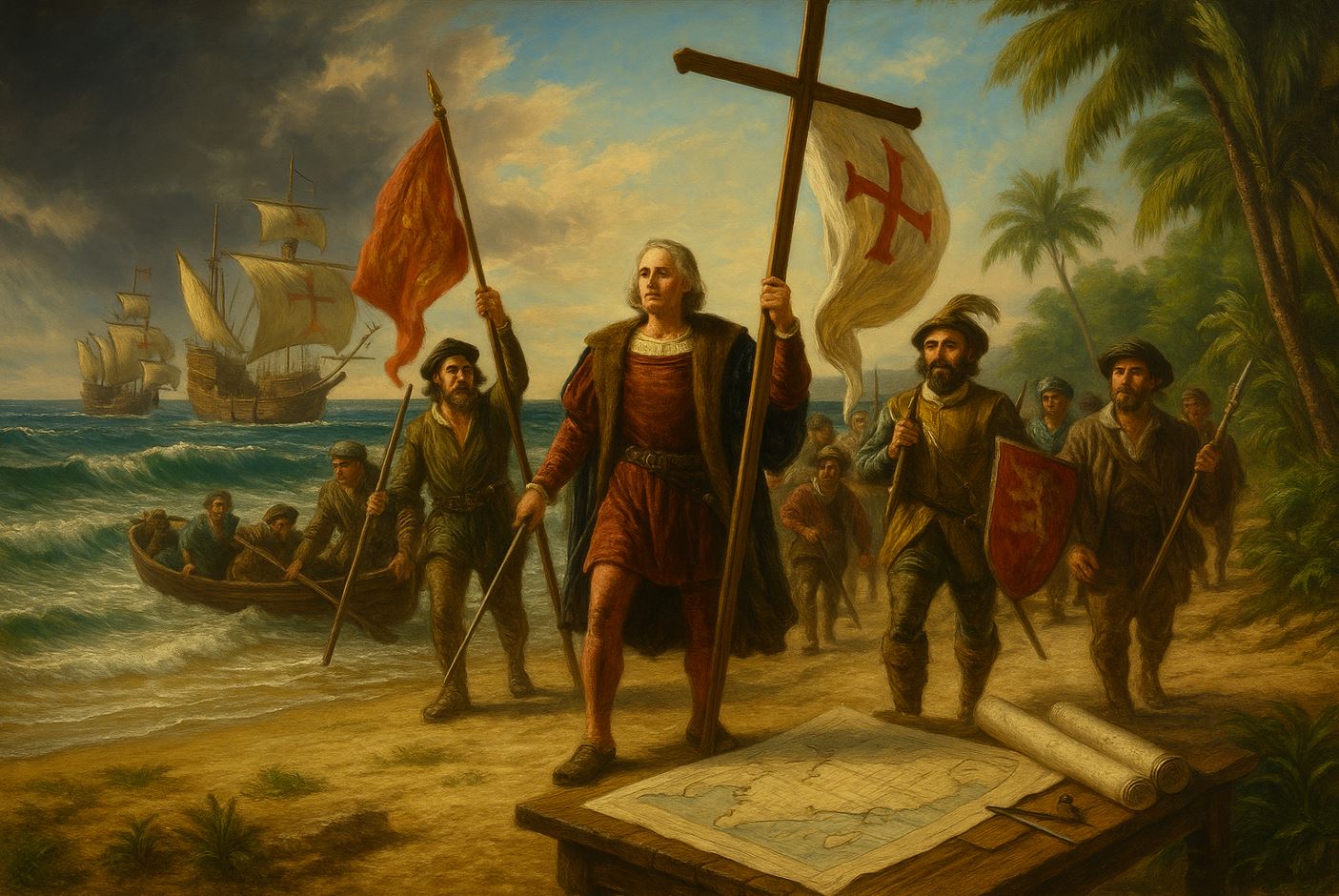
But an amazing incident was to interrupt the triumphal campaign. Already had this “second universe” been won in the East, already had the crowns and the treasures of the Indies been secured for King John II. It seemed that after the rounding of the Gape of Good Hope no other country could get ahead of Portugal, or do more than limp painfully in the rear. Prince Henry the Navigator had been careful to secure from the Pope a charter to the effect that all the lands, seas, and islands that lay beyond Cape Bojador on the West African coast, three hundred leagues from Cape St. Vincent, should belong exclusively to Portugal. Three other Popes had confirmed this remarkable donation, which, with a stroke of the pen, made the unknown East with its hundreds of millions of inhabitants the lawful property of the Portuguese Crown. Those who have indisputable security in their hands are not much inclined for further speculation. It is not surprising, therefore, that King John II should show little interest in the vague schemes of an obscure Genoese who demanded from the monarch a whole fleet “wherewith it may be found possible to reach the Indies from the west.” Christopher Columbus was, indeed, given friendly audience at Lisbon. He was not rudely rebuffed. But the court remembered that all previous expeditions for the discovery of the fabled island Antilia, which was said to lie to the west between Europe and India, had lamentably failed. Furthermore, why risk good Portuguese ducats for an uncertain western route to the Indies when, after years of arduous labour, the right path had so recently been discovered, and in the shipyards on the Tagus men were working overtime to construct the great fleet which, within the next few years, was to sail round the Cape of Good Hope to India? Like thunder from a clear sky, therefore, was the news which reached Lisbon that this Genoese adventurer, under the Spanish flag, had actually crossed the “Oceano Tenebroso”, and in a few weeks had discovered land in the west. A miracle had been worked. Fulfilled had been the mystical prophecy of Seneca’s tragedy Medea, which for long long years had fascinated the imagination of navigators: »venient annis saecula seris, quibus Oceanus vincula rerum laxet et ingens pateat tellus, Typhisque novos detegat orbes, nec sit terris Ultima Thula.« [en: In very truth they seemed to have become the days whenafter centuries, the ocean discloses its secrets, and an unknown land appears, for the pilot of the Argonauts discovers new spheres and Thule is no longer the most distant country in the world.]
Columbus, indeed, had no idea that he had discovered a new continent. Down to the day of his death he continued stubbornly to believe that he had reached the continent of Asia, and that by steering westward from his “Hispaniola” he would, within a few days, be able to reach the mouth of the Ganges. But that was why Portugal was so terribly alarmed. Of what use would be the papal charter conferring a right to all lands reached from the east, if Spain could steal a march upon her by reaching the Indies from the west? The labours of Prince Henry the Navigator for fifty years, and the labours of his successors during the thirty years since his death, had at one stroke been rendered futile. The Indies had been lost through the foolhardy venture of this wretched Genoese. If Portugal wished to retain her advantages and her privileges in the Indies, her only chance was to take up arms against these unexpectedly successful rivals.
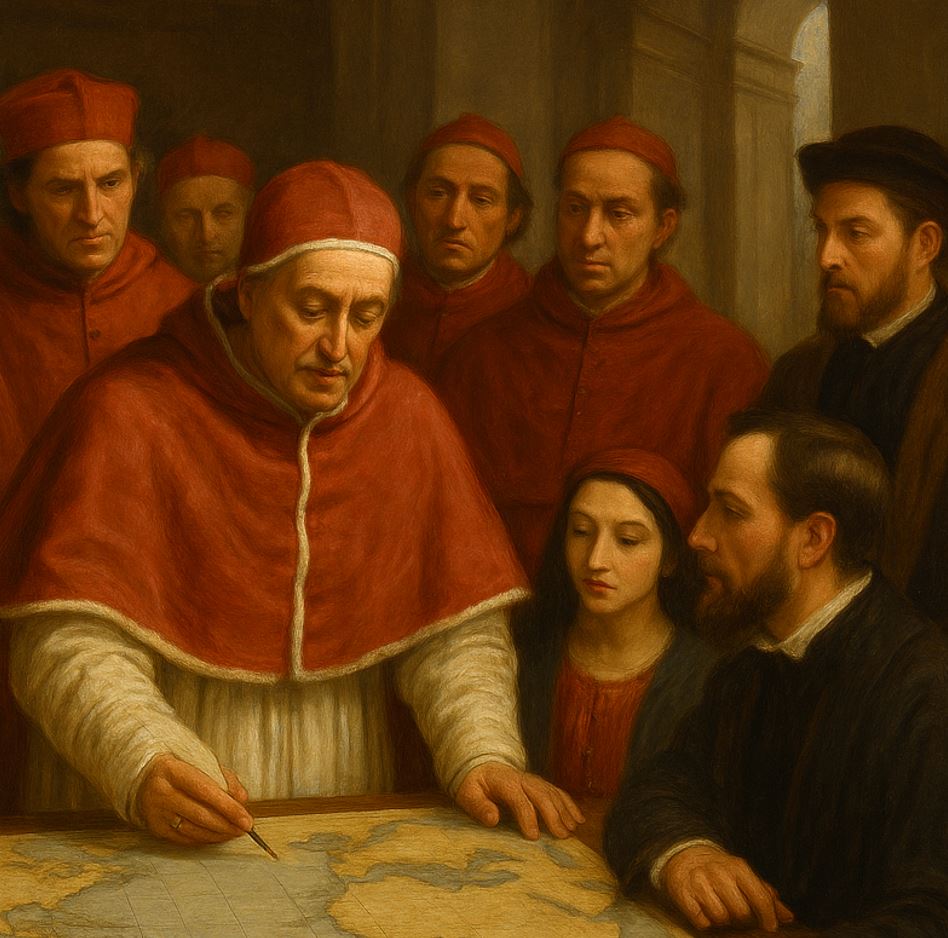
Fortunately the Pope was able to avert the threatening peril. Portugal and Spain were his favourite children, because their kings never tried to resist his will. They had fought the Moors and had expelled the infidels; with fire and sword they rooted out heresy; no other governments were so ready as the Portuguese and the Spanish to help the Holy Inquisition to deal roundly with Moors and Jews. His beloved children must not quarrel. His Holiness therefore decided to divide all as yet unknown parts of the world between Spain and Portugal— not, in the hypocritical terminology of modern diplomacy, as “spheres of influence,” but bestowed upon them out and out aa peoples, lands, islands, and seas, in virtue of his authority as Christ’s vicegerent on earth. Taking the globe as if it had been an apple, by the Bull of May 4, jag, he shoved it in wain. The line of section started a hundred’ leagues from the Cape Verde Islands. All undiscovered countries westward of this line were to belong to his dear child Spain; and that lay eastward, to his dear child Portugal. To begin the two children expressed themselves agreeing grateful for this gift. Soon, however, Portugal grew unwilling, and togged that the boundary should be thrust a little to the west. This was arranged by the Treaty or Convention of Tordesillas, on June 7 1494, whereby the line was transferred two hundred and seventy leagues to the west. Thanks to this revision, Portugal would receive the still undiscovered Brasilia.
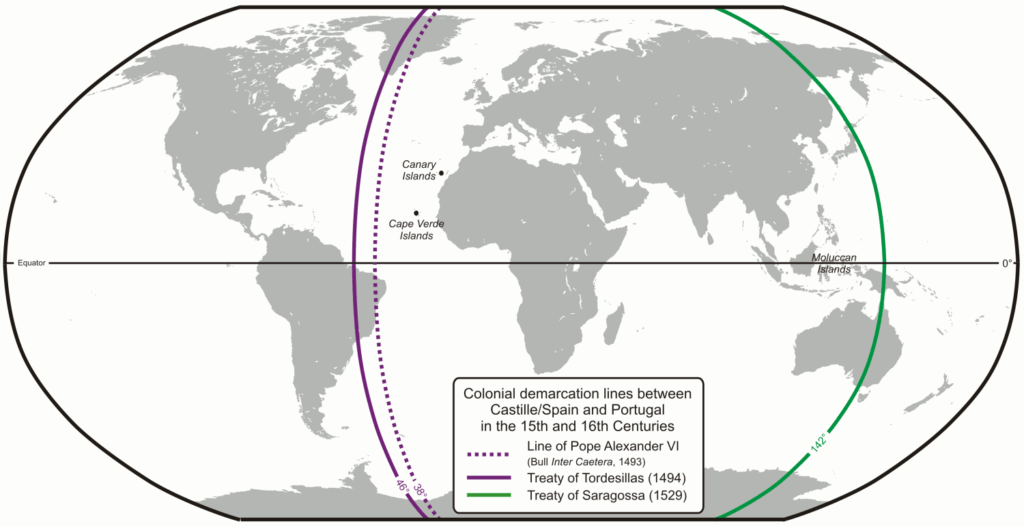
However grotesque, at first sight, may appear a generosity with thus bestowed the greater part of the world upon two nations, regardless of the claims of the others, one has to admire this peaceful solution as one of the rare acts of reason in history, where there is a conflict instead of violence through peaceful unification inasmuch as a potential dispute was settled by a peaceful understanding instead of by force. For years nay for decades, possible conflicts between Spain and Portugal were actually avoided thanks to the Convention of Tordesillas. The settlement was necessarily provisionally, because if you cut an apple completely with a knife, the cut line must also appear on the other, invisible surface. But within which half are the much sought after, the precious Spice Islands? Where the meridian traversed the other hemisphere, would it be to the east or to the west of the line of division? Would they be on the side of Portugal or on the side of Spain? At the date of the settlement, neither the Pope nor the kings nor the sages knew, for the globe had not yet been measured. Meanwhile, pending the final decision, the rival nations had plenty to do in swallowing the huge morsel which fate had assigned them: on the one hand, little Spain had to swallow the huge area of the Americas; and on the other, little Portugal had to swallow the whole of India and Africa. Columbus’s successful voyage aroused measureless astonishment in Europe.
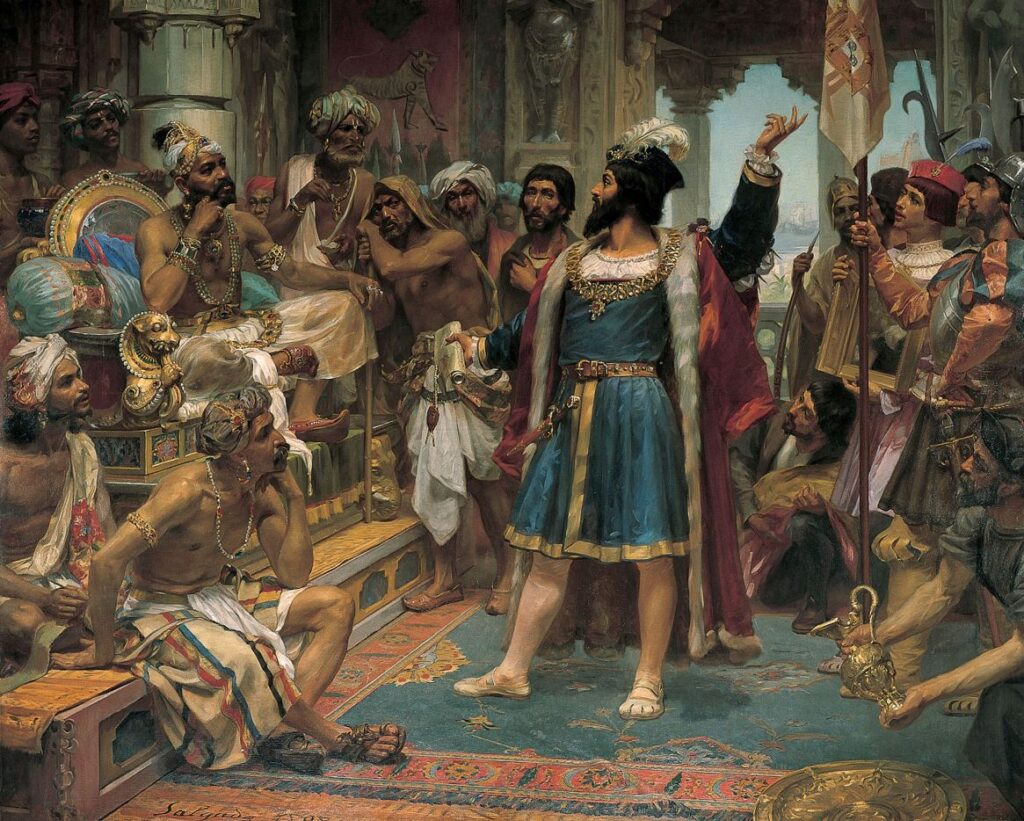
Immediately thereafter came a frenzy for adventure and discovery such as the Old World had never before known. The achievement of one courageous man will awaken the courage of an entire generation. Everyone in Europe who was discontented with his means and his position, everyone who felt himself thrust into the background and was too impatient to wait; younger sons, unemployed officers, bastards of the nobles, fugitives from justice— one and all wanted to go to the New World. The princes, the merchants, the speculators hastened to get together whatever ships were available; and it was necessary to hold aloof at the pike’s point the adventurers and swashbucklers who were all-too-eager to be recruited. Whereas Prince Henry the Navigator had had to induce the Pope to grant plenary absolution to participators in the voyages he planned, for otherwise he could not have secured crews, now whole villages flocked to the seaports, pestered the captains, and the recruiting-agents were hardly able to defend themselves from the press-gang of would-be sailors. One expedition followed in the wake of another. As if called into existence by magic, there were discovered, north, south, east, and west, new islands, new territories, some of them embedded in the ice, others luxuriant with palms. Within two or three decades, the few hundred little ships which set forth from Cadiz, Palos, and Lisbon discovered more previously unknown regions than had been discovered by all mankind in tens of thousands, nay hundreds of thousands of years.
Here is a brief catalogue of the incomparable results of these voyages of discovery. In 1498, Vasco de Gama, having rounded the Cape of Good Hope in the previous November, reached Calicut on the Malabar coast. The same year, Cabot (an Italian navigator in the English service) reached Newfoundland and the mainland of North America. In 1500, independently of one another, Pinzon under the Spanish flag and Cabral under the Portuguese discovered Brazil, while Caspar Cortereal, a Portuguese successor of the Vikings, reached Labrador. During the first years of the sixteenth century’, there was a further quick succession of wonderful discoveries. Two Portuguese expeditions, in one of which Amerigo Vespucci participated, followed down the South American coast as far as the Rio de la Plata. In 1500 the Portuguese discovered Madagascar; in 1505, Mauritius; in 1509 they reached Malacca, tlius having the key of the Malay Archipelago in their hands. In 1513, Ponce de Leon discovered Florida; also in 1513, from the peak of Darien, Nunez de Balboa, first of all Europeans, caught sight of the Pacific Ocean. Thenceforward there were no unknown seas. Within the brief space of a century, European navigators had increased their achievements, not a hundred-fold, but a thousand-fold. Whereas in 1418, under Prince Henry the Navigator, it had aroused astonishment when the first barcas reached Madeira, in 1518 Portuguese ships sailed as far as Canton. Soon a voyage to India was regarded as less venturesome than, not long before, had been the voyage to Cape Bojador.
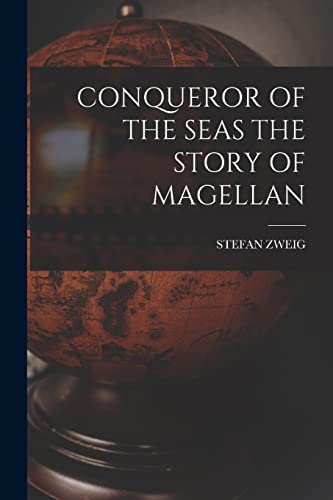
At such a winged tempo, the picture of the world was altered and extended from year to year, nay from month to month. By day and by night the cartographers were hard at work in Augsburg, but could not keep up with the unceasing demand for revised maps. These were snatched from their hands damp and still uncoloured. There was a like impetuous demand for stories of travel and for globes, now that everyone wanted news about the “mundus novus.” Hardly had the cosmographers revised their maps in accordance with the latest intelligence, when new reports arrived. The old representations had to be thrown aside, and fresh ones made, for what had been an island was now known to be a continent, a continent in which new rivers, new mountains had to be depicted; and the etchers had scarcely finished a new map when yet further news came to hand demanding further revision. Never before and never since have geography, cosmography, and cartography known such frenzied advances as during these fifty years, when, after ages of ignorance, the shape and size of the world were at length definitively established, the globular form of our revolving planet being now proved beyond dispute. This was the work of little more than one generation, whose navigators faced unknown dangers for all coming times, whose conquistadors vanquished lands and seas, whose heroes performed many of the tasks which an inert world had previously left undone. Only one thing remained to do— the last, the finest, and the most difficult – to circumnavigate the world on one and the same ship thus giving absolutely incontrovertible proof, in defencing the cosmologists and theologians of the past, that the earth has a round shape. It becomes the idea of life and the fate of the Fernão de Magelhaes, which history calls Magellan.
Source: Zweig, Stefan: Magellan – Conqueror of the Seas. Lexington (Plunkett Lake) 1960 Chapter 1, Page 13-38, license: public domain, edited and illustrated by Alexander vom Stein.
Image Credits:
Wikipedia: Carta marina / Olaus Magnus // Weltkarte mit Demarkationslinen zum Vertrag von Tordesillas / Lencer
all other pictures: license-free, public domain and ChtaGPT 4.0
